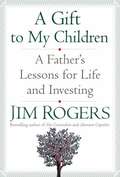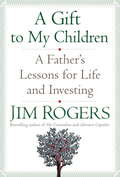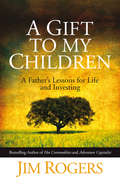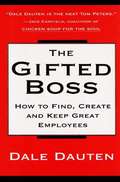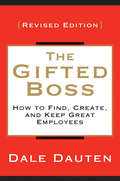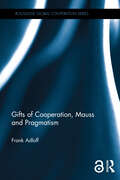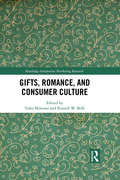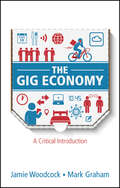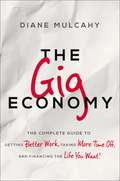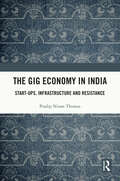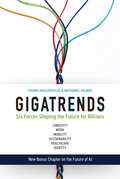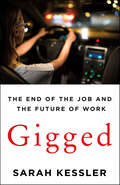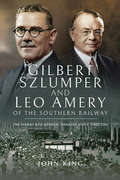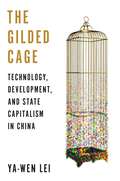- Table View
- List View
A Gift to My Children: A Father's Lessons for Life and Investing
by Jim RogersA Gift to My Children is a commonsense guide to personal finance. In practical advice books, as in life, there are no guarantees, and readers are cautioned to rely on their own judgment about their individual circumstances and to act accordingly.
A Gift to My Children
by Jim RogersWhen I was a boy, my father often pulled me aside to convey lessons intended to build what we generally refer to as "character". Often his advice was very simple - work hard, think for yourself, do right by others - but I believe those lessons provided the foundation for everything that has followed in my life. Now that I'm a dad myself, I wanted to put them down in one place, with examples of my own experiences, as a guide to life, adventure, and investing, both for my young daughters and for anyone seeking success in his or her chosen field. I hope that parents will be inspired to give this book to their children, and vice versa, as many of the lessons that I have learned apply not just to young people but to all adults-for example, question everything, never follow the crowd, and beware of boys!-A Gift to My Children
A Gift to my Children
by Jim RogersWhen I was a boy, my father often pulled me aside to convey lessons intended to build what we generally refer to as "character". Often his advice was very simple -- work hard, think for yourself, do right by others -- but I believe those lessons provided the foundation for everything that has followed in my life. Now that I'm a dad myself, I wanted to put them down in one place, with examples of my own experiences, as a guide to life, adventure, and investing, both for my young daughters and for anyone seeking success in his or her chosen field. I hope that parents will be inspired to give this book to their children, and vice versa, as many of the lessons that I have learned apply not just to young people but to all adults--for example, question everything, never follow the crowd, and beware of boys!What a lovely, lovely book! Though I've read all you've written, this one really touched me. It is, of course, a love letter to your daughters, which is not only a wonderful, meaningful thing to do, but it was filled with exactly the kind of advice all fathers should give. Your new book will stay on my shelf for a long, long time, and I'll be giving it to my own kids to read.--Nicholas Sparks, author of The Notebook, Dear John, and The Last Song
The Gifted Boss
by Dale DautenWant freedom from management, mediocrity and morons? Ever wonder what the best bosses know that you don't? Do you want to have great employees, people who don't need to be managed and who make everyone around them work harder and raise the department to a higher standard? The Gifted Boss is management guru Dale Dauten's classic-yet revolutionary-guidebook on teaching managers how to spot and court talent and how to give great employees what they want and need. This is a comprehensive system full of valuable insight and lessons aimed at creating the best work environment for the best people. Throughout The Gifted Boss, Dale Dauten defines his different breed of leader as one who is able to shape a business environment and culture that is a magnet for self-motivated employees. Dauten's starting point is a powerful fact about hiring great employees: the best ones are almost never in the job market. His system also includes a discussion of "ideal turnover" and how the great managers employ "the secret skill" of "de-hiring" to gracefully move mediocre employees up or out. Throughout his discussions, Dauten incorporates priceless knowledge gained from an exhaustive search for America's best bosses. The wisdom he acquired was startling, and it pertained to every type of organization: "Different isn't always better, but better is always different." The Gifted Boss has already earned itself a cult following. Now, based on conversations with hundreds of readers, Dauten has revised his work by adding a quick-start guide to help his audience get fast results and a discussion guide to help executives share the book with their teams. Though new technology continues to bring new changes to communication in the workplace, The Gifted Boss still remains the essential guide to maneuvering the tricky world of managing the modern employee. It belongs on every businessperson's desk.
The Gifted Bossition
by Dale DautenWant freedom from management, mediocrity and morons? Ever wonder what the best bosses know that you don't? Do you want to have great employees, people who don't need to be managed and who make everyone around them work harder and raise the department to a higher standard? The Gifted Boss is management guru Dale Dauten's classic-yet revolutionary-guidebook on teaching managers how to spot and court talent and how to give great employees what they want and need. This is a comprehensive system full of valuable insight and lessons aimed at creating the best work environment for the best people. Throughout The Gifted Boss, Dale Dauten defines his different breed of leader as one who is able to shape a business environment and culture that is a magnet for self-motivated employees. Dauten's starting point is a powerful fact about hiring great employees: the best ones are almost never in the job market. His system also includes a discussion of "ideal turnover" and how the great managers employ "the secret skill" of "de-hiring" to gracefully move mediocre employees up or out. Throughout his discussions, Dauten incorporates priceless knowledge gained from an exhaustive search for America's best bosses. The wisdom he acquired was startling, and it pertained to every type of organization: "Different isn't always better, but better is always different." The Gifted Boss has already earned itself a cult following. Now, based on conversations with hundreds of readers, Dauten has revised his work by adding a quick-start guide to help his audience get fast results and a discussion guide to help executives share the book with their teams. Though new technology continues to bring new changes to communication in the workplace, The Gifted Boss still remains the essential guide to maneuvering the tricky world of managing the modern employee. It belongs on every businessperson's desk.
Gifts from the Mountain: Simple Truths for Life's Complexities
by Eileen McDargh“Wonderfully profound …. It's as if Thoreau meets Lao Tzu on the trail and we are fortunate enough to overhear their wisdom on what the wilderness has to offer 21st century civilization.”— Jeff Salz, PhD, explorer, adventurer, anthropologist, and author of The Way of AdventureWhether you are a world-weary worker juggling the demands of a hectic life or a seeker of soul-satisfying experiences, this deceptively simple book is your key to refresh, renew, rethink, and recharge. From an unexpectedly arduous backpacking trip, Eileen McDargh discovers truths from the experience. Deep in grime, grit, and grace-filled mornings, she finds insights for business, for relationships, for family, for life, and for the soul.Just as the ocean inspired Anne Morrow Lindbergh's classic, Gifts from the Sea, so too can a mountain become a lyrical metaphor for coping with life's complexities. Whether musing on wild onions or mosquitoes, river crossings or thunderbolts, Eileen shares lessons for understanding the mundane and the magnificent, the difficult and the delightful, the ordinary and the extraordinary. Mountains become a lyrical metaphor for coping with life's complexities. You'll be reminded of what you may already know but have likely forgotten in the tension of time constraints, work worries, and family frustrations. McDargh will jar your memory, evoke new awareness, and spur you to action. Each two-page spread features a full-color watercolor painting illuminating these concise, graceful reflections. Gifts from the Mountain helps us pay attention to the process of life and to take joy in the journey.
The Gifts of Athena: Historical Origins of the Knowledge Economy
by Joel MokyrThe growth of technological and scientific knowledge in the past two centuries has been the overriding dynamic element in the economic and social history of the world. Its result is now often called the knowledge economy. But what are the historical origins of this revolution and what have been its mechanisms? In The Gifts of Athena, Joel Mokyr constructs an original framework to analyze the concept of "useful" knowledge. He argues that the growth explosion in the modern West in the past two centuries was driven not just by the appearance of new technological ideas but also by the improved access to these ideas in society at large--as made possible by social networks comprising universities, publishers, professional sciences, and kindred institutions. Through a wealth of historical evidence set in clear and lively prose, he shows that changes in the intellectual and social environment and the institutional background in which knowledge was generated and disseminated brought about the Industrial Revolution, followed by sustained economic growth and continuing technological change. Mokyr draws a link between intellectual forces such as the European enlightenment and subsequent economic changes of the nineteenth century, and follows their development into the twentieth century. He further explores some of the key implications of the knowledge revolution. Among these is the rise and fall of the "factory system" as an organizing principle of modern economic organization. He analyzes the impact of this revolution on information technology and communications as well as on the public's state of health and the structure of households. By examining the social and political roots of resistance to new knowledge, Mokyr also links growth in knowledge to political economy and connects the economic history of technology to the New Institutional Economics. The Gifts of Athena provides crucial insights into a matter of fundamental concern to a range of disciplines including economics, economic history, political economy, the history of technology, and the history of science.
Gifts of Cooperation, Mauss and Pragmatism (Routledge Global Cooperation Series)
by Frank AdloffThis book focuses on the contribution of Marcel Mauss (1872-1950) to social theory and a theory of cooperation. It shows that Mauss’s essay "The Gift" (1925) can be seen as a classic of a pragmatist, interactionist and anti-utilitarian sociology. It critiques the dichotomy of self-interest and normatively orientated action that forms the basis of sociology. This conceptual dichotomization has caused forms of social interaction (that cannot be localized either on the side of self-interest or on that of morality) to be overlooked or taken little notice of. The book argues that it is the logic of the gift and its reciprocity that accompany and structure all forms of interaction, from the social micro to the macro-level. It demonstrates that in modern societies agonistic and non-agonistic gifts form their own orders of interaction. This book uniquely establishes the paradigm of the gift as the basis for a theory of interaction. It will be of great interest to researchers and postgraduates in social theory, cultural theory, political sociology and global cooperation, anthropology, philosophy and politics.
Gifts of Cooperation, Mauss and Pragmatism (Routledge Global Cooperation Series)
by Frank AdloffThis book focuses on the contribution of Marcel Mauss (1872-1950) to social theory and a theory of cooperation. It shows that Mauss’s essay "The Gift" (1925) can be seen as a classic of a pragmatist, interactionist and anti-utilitarian sociology. It critiques the dichotomy of self-interest and normatively orientated action that forms the basis of sociology. This conceptual dichotomization has caused forms of social interaction (that cannot be localized either on the side of self-interest or on that of morality) to be overlooked or taken little notice of. The book argues that it is the logic of the gift and its reciprocity that accompany and structure all forms of interaction, from the social micro to the macro-level. It demonstrates that in modern societies agonistic and non-agonistic gifts form their own orders of interaction. This book uniquely establishes the paradigm of the gift as the basis for a theory of interaction. It will be of great interest to researchers and postgraduates in social theory, cultural theory, political sociology and global cooperation, anthropology, philosophy and politics.
Gifts, Romance, and Consumer Culture (Routledge Interpretive Marketing Research)
by Yuko Minowa Russell W. BelkHow do people communicate their romantic feelings? Gift giving is one way. Giving and receiving of gifts is a characteristic of intimate relationships. Gifts are a message, a form of communication with a tangible material object, about love, affection, or concern for the recipient. The "romantic gift" evokes a multitude of intertwined meanings: passion, intimacy, affection, persuasion, care, celebration, altruism, and nostalgia. They can also connote the negative images of obligation and reciprocity. Romantic gift giving may be practiced at rituals, during rites of passage, or for casual occasions, to affirm the continued importance of the romantic relationship. We may even romanticize the giving of gifts to the self, to nonhuman companions, and to others we do not know personally. If loving and giving are a practice, then romantic gift giving is a practice of loving with intimate—or would-be intimate—others. This book addresses gift giving among consumers attempting to express and construct romantic love. It lies at the intersection of consumption, markets, and culture. In societies shaped by the globalizing neo-liberal economic order, increasing wealth disparity, and a partially digitized social environment that they help to co-construct, it may be time to rethink romantic love. Gift giving is a key arena to do so, as gifts make love tangible and act as carriers of meaning as well as cultural symbols. In gift giving the meanings of romance are renewed, renegotiated, and reconstructed. Gifts, Romance, And Consumer Culture demonstrates a wide variety of scholarly work bearing on romantic gift giving using an interpretive consumer research perspective. The book introduces critical studies by scholars in this unfolding and new interdisciplinary field.
The Gig Economy: A Critical Introduction
by Mark Graham Jamie WoodcockAll of a sudden, everybody’s talking about the gig economy. From taxi drivers to pizza deliverers to the unemployed, we are all aware of the huge changes that it is driving in our lives as workers, consumers and citizens. This is the first comprehensive overview of this highly topical subject. Drawing upon years of research, stories from gig workers, and a review of the key trends and debates, Jamie Woodcock and Mark Graham shed light on how the gig economy came to be, how it works and what it’s like to work in it. They show that, although it has facilitated innovative new services and created jobs for millions, it is not without cost. It allows businesses and governments to generate value while passing significant risk and responsibility onto the workers that make it possible. This is not, however, an argument for turning back the clock. Instead, the authors outline four strategies that can produce a fairer platform economy that works for everyone. Woodcock and Graham’s critical introduction will be essential reading for students, scholars and general readers interested in the massive shifts that characterize our modern digital economy.
The Gig Economy: The Complete Guide to Getting Better Work, Taking More Time Off, and Financing the Life You Want
by Diane MulcahyFrom Uber to the presidential debates, the gig economy has been dominating the headlines...and for good reason. Today, more than a third of Americans are working in the gig economy--mixing together short-term jobs, contract work, and freelance assignments. For those who've figured out the formula, life has never been better!The Gig Economy is your guide to this uncertain but ultimately rewarding world. Succeeding in it starts with shifting gears to recognize that only you control your future. Next is leveraging your skills, knowledge, and network to create your own career trajectory--one immune to the whims of an employer.Packed with research, exercises, and anecdotes, this eye-opening book supplies strategies--ranging from the professional to the personal--to help you:Construct a life based on your priorities and vision of successCultivate connections without networkingCreate your own securityTake more time offBuild flexibility into your financial lifeFace your fears by reducing riskPrepare for the futureAnd much moreLayoffs... recessions...Corporate jobs are not only unstable-- they're increasingly scarce. It's time to take charge of your own career and lead the life you actually want.
The Gig Economy in India: Start-Ups, Infrastructure and Resistance
by Pradip Ninan ThomasThe Gig Economy in India explores the topic of gig work in India’s digital political economy, and the relationship between key factors such as start-ups, state governments, and platform providers.The book begins by placing the gig economy in context, defining the platform ecosystem and the Indian government’s perception of its problems and opportunities. Thomas then examines the critical dimensions of the gig economy in India, from its data infrastructure capabilities, the enabling role of venture capitals and FinTech, to government regulations. Attention is paid to the precarity of gig labour, the vagaries of algorithmic management, and the minimal legal support available for workers. The book also includes chapters on labour resistance and highlights some of the issues related to the ethics of artificial intelligence.Given the limited research on India as a case study, this volume fills a crucial gap in the literature. It will interest scholars in diverse fields such as business management, digital media, and communication studies.
The Gig Economy: Leasing Skills to Pay the Bills
by William R. Kerr Joseph B. Fuller Carl KreitzbergThis primer provides a comprehensive exploration into the gig economy and how it is reshaping global business. It shows how the Uber driver, the freelancing programmer in India, and the independent corporate consultant are all different variants of the modern-day gig workers. In doing so, this document addresses the following questions: What are gigs and who performs them? What is the size of the gig economy? How big will it get? What types of gig work are available, and how do they differ from one another? What are major trends in the gig economy, and how could technology disrupt this space? What are the key management and legal issues for companies that use gig workers? What has been the recent legal and regulatory history of the gig economy?
Gigatrends: Six Forces That Are Changing the Future for Billions
by Thomas Koulopoulos Nathaniel PalmerGigatrends offers a roadmap for navigating six of the most disruptive trends shaping the future.Humanity stands at the precipice of a remarkable new era in global history filled with both immense opportunities and daunting challenges. Gigatrends examines how six disruptive trends can be harnessed to create new social, economic, and organizational solutions that will usher in the promise of a human-centered future for billions of people. But moving forward won&’t be easy. Gigatrends will disrupt nearly every existing socioeconomic system built over the past three hundred years. Navigating these seismic shifts will require a new set of skills, frameworks, and tools to help us move forward. Gigatrends will provide you with the insights to: • Understand how each of the six Gigatrends will shape your future • Predict how digital workers and AI will reshape the workforce • Create new social, economic, and organizational global ecosystems • Navigate the seismic shifts of a rapidly changing and uncertain world • Achieve a human-centered future that works for all of humanity • Recognize how digital identity will create a new era of prosperity The world is at an inflection point. It's time to understand and embrace the revolutionary power of Gigatrends to shape a future that&’s filled with hope and opportunity for all of humanity.
Gigged: The End of the Job and the Future of Work
by Sarah Kessler"With deep reporting and graceful storytelling, Sarah Kessler reveals the ground truth of a key part of the American workforce. Her analysis is both astute and nuanced, making GIGGED essential reading for anyone interested in the future of work." —Daniel H. Pink, author of WHEN and DRIVEThe full-time job is disappearing—is landing the right gig the new American Dream?One in three American workers is now a freelancer. This “gig economy”—one that provides neither the guarantee of steady hours nor benefits—emerged out of the digital era and has revolutionized the way we do business. High-profile tech start-ups such as Uber and Airbnb are constantly making headlines for the disruption they cause to the industries they overturn. But what are the effects of this disruption, from Wall Street down to Main Street? What challenges do employees and job-seekers face at every level of professional experience?In the tradition of the great business narratives of our time, Gigged offers deeply-sourced, up-close-and-personal accounts of our new economy. From the computer programmer who chooses exactly which hours he works each week, to the Uber driver who starts a union, to the charity worker who believes freelance gigs might just transform a declining rural town, journalist Sarah Kessler follows a wide range of individuals from across the country to provide a nuanced look at how the gig economy is playing out in real-time.Kessler wades through the hype and hyperbole to tackle the big questions: What does the future of work look like? Will the millennial generation do as well as their parents? How can we all find meaningful, well-paid work?
Gilbert Szlumper and Leo Amery of the Southern Railway: The Diaries of a General Manager and a Director
by John KingVery few diaries of directors and senior managers of the Big Four railways have survived to enter the public domain. There are, however, two notable Southern Railway diarists whose records have been available in archives for some years, but have been largely ignored by historians; Southern Railway General Manager Gilbert Szlumper and Director Leopold Amery. Their remarkable diaries are addressed in this insightful book, which gives a slightly different view of the company in contrast to the almost sanitized histories by some writers.The surviving diaries of Szlumper are far from complete. They begin in 1936 and continue into the war years, but there are several gaps. Throughout, Szlumper comments on individuals and developments, revealing little-known facts and the circumstances that meant he could never truly achieve his potential. Formally retiring in 1942, he died in 1969, after which his diaries entered the public domain.Leopold Amery was director of the Southern Railway from 1932. A Birmingham Member of Parliament for many years, he was a statesman of some stature, his high offices including Secretary of State for the Colonies in the 1920s. In his autobiography, Amery writes very little on the railway, although he does comment on its family atmosphere. His diaries, which are in the public domain in a Cambridge University archive, have been published in two volumes but Amerys fascinating business activities were omitted by the publisher, and like Szlumper he comments on individuals and developments.The diary information of these two exceptional men has been supplemented by information from the railway, state archives and other sources, and many of the photographs have never been published before.
Gilberto Dimenstein and Community Empowerment in Brazil (A)
by Ai-Ling Jamila Malone Alexandre Naghirniac Rosabeth Moss KanterIn 2011, Gilberto Dimenstein, a well-known Brazilian journalist, created a new model that connected disparate resources to revitalize Sao Paulo. He wanted his model to expand across Brazil and the world. Dimenstein covered many of the social issues facing Brazil as a journalist and became determined to create solutions. Dimenstein started two social ventures, ANDI and Escola Aprendiz, before creating and developing Catraca Livre (meaning "open turnstile" in Portuguese) while he was an Advanced Leadership fellow at Harvard. Dimenstein pursued his idea of "learning neighborhoods", which meant a localized, low cost and effective way to leverage the existing available resources as educational opportunities. The resources were underutilized because of a lack of awareness. He believed that education should not be limited to the classroom and instead should be expanded to the entire city. Catraca Livre enabled Sao Paulo's residents to utilize untapped resources by aggregating all of the available resources and disseminating the information through multiple avenues including a website, subways, restaurants, workplaces, and more. This case shows how Dimenstein spearheads his solution to improve his city and offers a model for revitalizing cities around the world.
Gilded: Breaking Free from the Cage of Ambition, Perfectionism, and the Relentless Pursuit of More
by Keren EldadBreak Free from the Trap of Ambition &“I highly recommend Keren Eldad&’s new book, GILDED, which comes at a time when many people are struggling with the strictures of ambition and perfectionism. Keren&’s approach gives readers the power to break free from the trance of pursuing &‘more&’ and celebrate the present moment.&” –– Gay Hendricks, NYT bestselling author of The Big Leap GILDED by Keren Eldad is the go-to guide for overachievers and high performers who feel trapped in the endless cycle of chasing success. If you're ready to break free from perfectionism anxiety and discover true fulfillment, this book will guide you toward a life of authenticity and freedom. Are you an overachiever who feels unfulfilled despite your success? For those driven by ambition, perfectionism, and a relentless pursuit of more, it&’s easy to lose sight of what truly matters. In GILDED, Keren Eldad explores why so many high performers—whether C-suite executives or go-getters—feel trapped by the very success they sought, finding themselves unfulfilled despite outward achievements. Do you want to break free from the pressure of always needing more? If you&’re tired of perfectionism anxiety and constantly moving the goalposts of success, GILDED offers a fresh perspective. Drawing from executive coaching and personal experiences, Eldad provides practical strategies to help you step out of the gilded cage, stop chasing hollow victories, and start living a life of genuine abundance and fulfillment. Inside, you&’ll find: Actionable strategies to overcome perfectionism anxiety and embrace self-reflection for lasting personal growth. Practical insights for high performers and leaders who seek purpose beyond external success. Tools from executive coaching designed to help you redefine your ambitions and live authentically. If you liked other leadership development books such as The Coaching Habit, High Performance Habits, or Why Smart, Creative and Highly Sensitive People Hurt, you&’ll love GILDED.
The Gilded Cage: Technology, Development, and State Capitalism in China
by Ya-Wen LeiHow China&’s economic development combines a veneer of unprecedented progress with the increasingly despotic rule of surveillance over all aspects of lifeSince the mid-2000s, the Chinese state has increasingly shifted away from labor-intensive, export-oriented manufacturing to a process of socioeconomic development centered on science and technology. Ya-Wen Lei traces the contours of this techno-developmental regime and its resulting form of techno-state capitalism, telling the stories of those whose lives have been transformed—for better and worse—by China&’s rapid rise to economic and technological dominance.Drawing on groundbreaking fieldwork and a wealth of in-depth interviews with managers, business owners, workers, software engineers, and local government officials, Lei describes the vastly unequal values assigned to economic sectors deemed &“high-end&” versus &“low-end,&” and the massive expansion of technical and legal instruments used to measure and control workers and capital. She shows how China&’s rise has been uniquely shaped by its time-compressed development, the complex relationship between the nation&’s authoritarian state and its increasingly powerful but unruly tech companies, and an ideology that fuses nationalism with high modernism, technological fetishism, and meritocracy.Some have compared China&’s extraordinary transformation to America&’s Gilded Age. This provocative book reveals how it is more like a gilded cage, one in which the Chinese state and tech capital are producing rising inequality and new forms of social exclusion.
Gilead: Hepatitis-C Access Strategy (A)
by David E. Bloom Vikram Rangan V. Kasturi RanganGilead had come up with an innovative drug for Hepatitis C, which affected 180 million people worldwide. The drug was priced at $1,000 a pill for the US market. Gilead had to decide how to price and market the pill in developing countries that bore the brunt of the disease. The company had earned accolades for its work in HIV/AIDS, where its innovative medicines now accounted for 60% of all patients on Anti-Retroviral (ARV) medicines. Much of this was accomplished through generic licensing, which brought a $10,000/year treatment regimen down to $100! Should the company replicate that strategy for Hepatitis C? If so, how would its US Healthcare customers, who were paying $84,000 per patient, react? On the other hand, Gilead had to balance the interests of its shareholders, who paid $11 billion for an acquisition that led to the new Hepatitis C drug.
Gilead: Hepatitis C Access Strategy (B)
by V. Kasturi RanganWhile the Gilead: Hepatitis-C Access Strategy (A) case (515-025) poses questions on what the company should do with respect to hart hit countries like Egypt and India, this (B) case provides the answer. In both cases, the company chose to pursue a proactive strategy to enable access at affordable prices.
Gilead: Hepatitis-C Access Strategy (A)
by V. Kasturi Rangan David E. Bloom Vikram RanganGilead had come up with an innovative drug for Hepatitis C, which affected 180 million people worldwide. The drug was priced at $1,000 a pill for the US market. Gilead had to decide how to price and market the pill in developing countries that bore the brunt of the disease. The company had earned accolades for its work in HIV/AIDS, where its innovative medicines now accounted for 60% of all patients on Anti-Retroviral (ARV) medicines. Much of this was accomplished through generic licensing, which brought a $10,000/year treatment regimen down to $100! Should the company replicate that strategy for Hepatitis C? If so, how would its US Healthcare customers, who were paying $84,000 per patient, react? On the other hand, Gilead had to balance the interests of its shareholders, who paid $11 billion for an acquisition that led to the new Hepatitis C drug.
Gilead: Hepatitis-C Access Strategy (A) (Abridged)
by David E. Bloom V. Kasturi Rangan Vikram RanganGilead had come up with an innovative drug for Hepatitis C, which affected 180 million people worldwide. The drug was priced at $1,000 a pill for the US market. Gilead had to decide how to price and market the pill in developing countries that bore the brunt of the disease. The company had earned accolades for its work in HIV/AIDS, where its innovative medicines now accounted for 60% of all patients on Anti-Retroviral (ARV) medicines. Much of this was accomplished through generic licensing, which brought a $10,000/year treatment regimen down to $100! Should the company replicate that strategy for Hepatitis C? If so, how would its US Healthcare customers, who were paying $84,000 per patient, react? On the other hand, Gilead had to balance the interests of its shareholders, who paid $11 billion for an acquisition that led to the new Hepatitis C drug.
